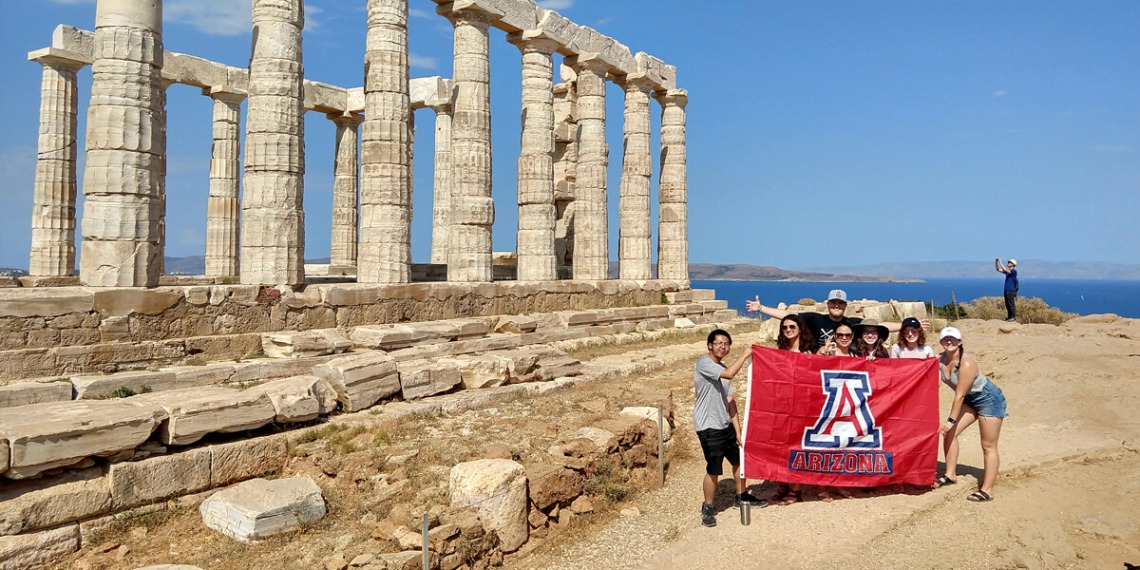All students majoring in Classics are required to choose one of the following Concentrations:
Classical Civilization
A major in Classical Civilization provides students with a flexible array of courses, centered around a core of language and literature from the Classical world.
Classical Languages
A major in Classical Languages provides students with a solid grounding in Ancient Greek and Latin, so that they can explore the Classical World in its original languages.

Double Majors & Dual Degrees
Many Classics majors have double majors or dual degrees and benefit from generous double-dipping policies.
Classics & Religious Studies
Double majors in Classics and Religious Studies can double-count up to 15 units (15 credit hours) in shared coursework.
Two Options for Classics Majors
Classical Civilization
With an emphasis in Classical Civilization, students gain an intermediate proficiency with a relevant foreign language (satisfying their university language requirement), and are introduced to a broad spectrum of ancient literature. All remaining credits may be chosen from a large variety of courses, depending on students' goals and interests.
This degree requires 32 units, including:
- 8 Units (2 courses) in Intermediate Languages, either Ancient Greek (GRK 201-202 or 212), Latin (LAT 201-202 or 212), or Modern Greek (CRL 201-403 and CRL 202-403; see the Critical Languages Program for more information on Modern Greek);
- 6 Units (2 courses) in Literature in Translation Classes Classics 301A and Classics 301B; (formerly 250A and 250B);
- 12 Upper Division Elective Units (4 courses) selected from any Classics, Greek, or Latin courses numbered 300 or higher;
- 6 Additional Elective Units (2 courses) These courses may include Classics, Greek, or Latin courses.*
*1XX-level language courses cannot be used to satisfy a major/minor IF a.) that language is used to satisfy the University Foundations requirement and/or b.) that language is used to satisfy the language requirements for the classics major (dictated by the emphasis).
N.B.: University policy does not allow courses offered for Tier 1 General Education credit to be applied to any major or minor.
Not sure about the major quite yet?
Start with the minor! We offer a Minor in Classics as well as Ancient Greek, Latin and New Testament Language & Literature. Minor in Classics
Classical Languages
With an emphasis in Classical Languages, students gain at least an intermediate proficiency in both ancient languages (satisfying their university language requirement), and advanced proficiency in at least one of the languages, and are introduced to a broad spectrum of ancient literature. Remaining credits may be chosen from a large variety of courses, depending on students' goals and interests. This track is ideal for students who wish to pursue graduate study in Classics or related fields or are passionate about languages or linguistics.
This degree requires 32 units, including:
- 6-8 Units (Usually 2 courses) in Intermediate Ancient Greek (GRK 201-202 or 212)
- 6-8 Units (Usually 2 courses) in Intermediate Latin (LAT 201-202 or 212)
- 6 Units (2 courses) Upper Division Language Course Work (any (ancient) GRK or LAT course numbered 400 or higher)
- 6 Units (2 courses) in Literature in Translation Classes Classics 301A and Classics 301B; (formerly 250A and 250B);
- 6 Upper Division Elective Units (2 courses) selected from any Classics, Greek, or Latin courses numbered 300 or higher.
Not sure about the major quite yet?
Start with the minor! We offer a Minor in Ancient Greek as well as a Minor in Latin. Minor in Classics
Additional Degree Information
Writing Requirement
Every undergraduate degree program requires satisfaction of the Mid-Career Writing Assessment (MCWA).
Grade Minimum
In order to assure that students are adequately prepared for the required Writing Emphasis course in the major, the Department of CLASSICS requires that students earn an "A" or "B" in English 102, 108, 104 or 109. The department offers options for students who earn less than a "B" in these classes.
Option 1
Receive a "C" or higher in CLASSICS 301A or CLASSICS 301B, which will be taught by tenure-stream faculty whenever practicable.
Option 2
Students who do NOT receive a "C" or higher in CLASSICS 301A or CLASSICS 301B must:
- Attend workshops and tutorial support through the Writing Skills Improvement Program or attend workshops and peer consultations through the Writing Center.
In addition, students must either:
- enroll in a two-unit Independent Study (CLASSICS 3xx) with the professor who taught the relevant 301A or 301B course (when practicable) and write a total of 10 pages (which may be either a single paper or several shorter papers) for a grade of "C" or higher
- GRO CLASSICS 301A or CLASSICS 301B for a grade of "C" or higher.
Questions about General Education courses?
For information on General Education and overall degree requirements associated with majors offered by the College of Humanities, please meet with an advisor at the College of Humanities Academic Advising Center and/or review the degree requirements.
Not sure about the major quite yet?
Start with the minor! Most courses in the minor can be used in the major too.

